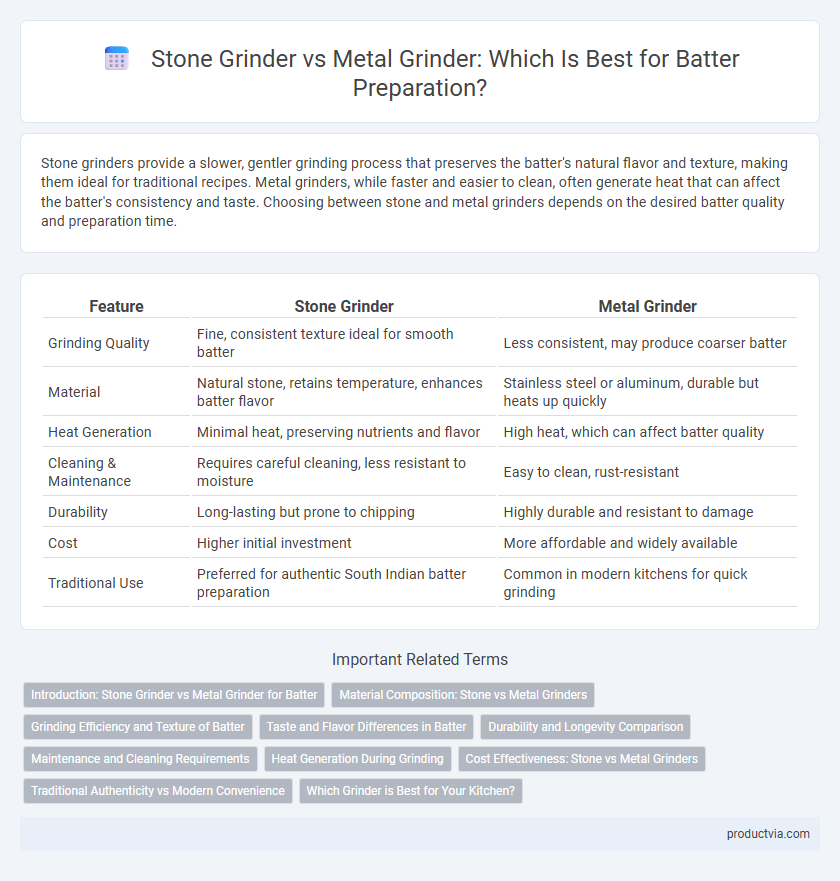Stone grinders provide a slower, gentler grinding process that preserves the batter's natural flavor and texture, making them ideal for traditional recipes. Metal grinders, while faster and easier to clean, often generate heat that can affect the batter's consistency and taste. Choosing between stone and metal grinders depends on the desired batter quality and preparation time.
Table of Comparison
| Feature | Stone Grinder | Metal Grinder |
|---|---|---|
| Grinding Quality | Fine, consistent texture ideal for smooth batter | Less consistent, may produce coarser batter |
| Material | Natural stone, retains temperature, enhances batter flavor | Stainless steel or aluminum, durable but heats up quickly |
| Heat Generation | Minimal heat, preserving nutrients and flavor | High heat, which can affect batter quality |
| Cleaning & Maintenance | Requires careful cleaning, less resistant to moisture | Easy to clean, rust-resistant |
| Durability | Long-lasting but prone to chipping | Highly durable and resistant to damage |
| Cost | Higher initial investment | More affordable and widely available |
| Traditional Use | Preferred for authentic South Indian batter preparation | Common in modern kitchens for quick grinding |
Introduction: Stone Grinder vs Metal Grinder for Batter
Stone grinders preserve the natural flavor and texture of batter by gently grinding grains at low temperatures, ensuring optimal nutrient retention and smooth consistency. Metal grinders, often faster and more durable, can generate heat that may affect the batter's taste and nutritional quality. Choosing between stone and metal grinders depends on balancing traditional quality with efficiency and maintenance preferences.
Material Composition: Stone vs Metal Grinders
Stone grinders are made from natural granite or granite composite, providing a coarse, textured surface that gently crushes grains and spices, preserving their natural oils and enhancing flavor. Metal grinders, typically constructed from stainless steel or aluminum, offer durability and resistance to corrosion but may generate heat during grinding, potentially affecting the batter's taste and nutritional content. The porous nature of stone grinders absorbs moisture, creating a smoother batter consistency, whereas metal grinders are non-porous, often resulting in a slightly different texture due to faster grinding speeds.
Grinding Efficiency and Texture of Batter
Stone grinders excel in grinding efficiency by generating less heat, preserving the natural flavors and nutrients in the batter, while producing a smoother and creamier texture ideal for traditional recipes like dosa and idli. Metal grinders grind faster but tend to generate more heat, which can alter the batter's fermentation process and lead to a coarser texture. Choosing a stone grinder enhances the batter's consistency and overall quality, making it preferable for achieving authentic taste and texture in batter preparation.
Taste and Flavor Differences in Batter
Stone grinders preserve the natural oils and nutrients in the batter ingredients, resulting in a richer and more authentic taste compared to metal grinders. The slow grinding process of stone grinders enhances the complex flavors and aroma by minimizing heat generation, which can alter the batter's flavor profile. Metal grinders, while faster, often generate heat that can cause subtle changes in taste and reduce the overall depth and freshness of the batter flavor.
Durability and Longevity Comparison
Stone grinders offer superior durability and longevity compared to metal grinders due to their robust, natural materials that resist wear and tear over time. Metal grinders, while often lighter and easier to handle, tend to degrade faster when exposed to constant moisture and batter acid, leading to rust and reduced lifespan. Investing in a high-quality stone grinder ensures consistent performance and long-term use, making it a preferred choice for batter preparation.
Maintenance and Cleaning Requirements
Stone grinders require careful maintenance to prevent residue buildup, requiring regular thorough cleaning with non-abrasive brushes and occasional oiling to keep the grinding surface smooth. Metal grinders typically offer easier cleaning, as stainless steel surfaces resist sticking and can be rinsed or wiped down quickly without special treatments. Both types benefit from prompt cleaning after use to avoid contamination and ensure consistent batter quality.
Heat Generation During Grinding
Stone grinders generate less heat during the grinding process compared to metal grinders, preserving the batter's nutrients and flavor. The slow, cold grinding action of stone mills prevents overheating, which is critical for maintaining the integrity of enzymes and proteins in grains or lentils. Metal grinders tend to produce more heat, potentially affecting the batter's texture and fermentation quality.
Cost Effectiveness: Stone vs Metal Grinders
Stone grinders offer superior grinding quality and durability but come with a higher initial cost and require more maintenance, making them less cost-effective for occasional use. Metal grinders tend to be more affordable, easier to maintain, and suitable for frequent use, providing better overall cost efficiency despite potentially lower grinding precision. Choosing between stone and metal grinders depends on balancing upfront investment against long-term maintenance and grinding performance needs.
Traditional Authenticity vs Modern Convenience
Stone grinders preserve traditional authenticity by using slow grinding techniques that retain the natural flavors and nutritional value of batter, favored in South Indian cuisine for dosa and idli preparation. Metal grinders offer modern convenience with faster grinding speeds and easy maintenance, but may generate heat that slightly alters texture and taste. Choosing between stone and metal grinders depends on prioritizing a genuine culinary experience or efficient kitchen workflow.
Which Grinder is Best for Your Kitchen?
Stone grinders preserve the natural texture and flavor of batter by grinding grains slowly at low temperatures, preventing nutrient loss. Metal grinders offer speed and durability but may generate heat that affects batter quality and can introduce a metallic taste. For a kitchen prioritizing traditional authenticity and nutritional benefits, a stone grinder is the best choice, while metal grinders suit those needing quick, high-volume batter preparation.
Stone grinder vs metal grinder for batter Infographic

 productvia.com
productvia.com